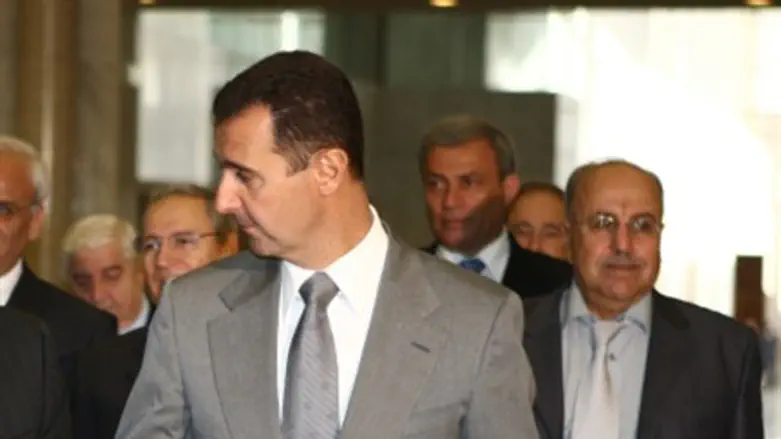
A former top general in Syria's chemical weapons program said on Monday he doesn't doubt for a moment that President Bashar al-Assad will deploy his chemical weapons arsenal as he tries to hold onto power and crush the uprising that started almost two years ago.
"The regime started to fall and deteriorate. It's coming to its end," retired Major General Adnan Sillou told ABC News from a hotel near Antakya, on Turkey's southern border with Syria.
"It's highly possible that he'll start using [chemical weapons] to kill his own people because this regime is a killer," he added.
Sillou told ABC News that until September 2008, he was chief of staff on the defensive side of the Syrian chemical weapons program. He said he was in charge of training soldiers against attacks and contact with the weapons, as well as procuring safety equipment to guard against them.
He listed mustard gas along with the sarin, VX and tabun nerve agents as the main elements in Syria's chemical arsenal, whose existence Syria doesn't even acknowledge. Foreign intelligence officials and analysts have focused on the first three as the main threats, and last week U.S. officials said there was evidence sarin had not only been moved, but its binary components, usually stored separately, had been combined and placed into bombs for use.
Sillou accused Assad's forces of already spraying pesticides and dropping white phosphorous, claims also made by opposition activists.
"They're idiots, crazy. Simply they are killers," he said.
Sillou said he believes the regime could step it up to more serious chemical weapons if Aleppo, Syria's most populous city where fighting has raged for months, falls to the rebels. On Sunday, radical Islamist rebels seized large swathes of a Syrian military base west of Aleppo.
President Obama and other world leaders have said use of chemical weapons by Assad would cross a "red line" and invite an as-yet undefined action, possibly military.
The United States and its allies, including Israel, have repeatedly expressed concern that Syria's stockpile, believed to be one of the biggest in the world, could be stolen and fall into extremist hands or be transferred to the Hizbullah terror group by a crumbling Syrian regime.
"Syria has 600 chemical warheads apart from the liquid chemical substance which is being stored," Sillou told ABC News. "The bombs are easily transported from one place to another. To Hizbullah, which could be used against Israel, to [Shiite cleric] Moqatada al-Sadr in Iraq. The regime can give it to any friendly groups."
"They are not safe at all," Sillou said of the facilities. Asked about the dozens of chemical weapons sites the U.S. believes to be spread across the country, he said the primary facilities are called 417 and 418, near Damascus and the third-largest city Homs, respectively.
Sillou told ABC News the arsenal was developed as a counterbalance to Israel's nuclear arsenal, but added the weapons would only be used against external forces if Syria was attacked.
Only two people have the power to order a chemical weapons attack aside from Assad, Sillou said: the head of Air Force intelligence Jamil Hassan and head of state security Ali Mamlouk.
However, "I don't think it will be used without [Assad's] consent," he told ABC.
Sillou is now hoping to mount a brigade called "Mountain Heroes," comprising some 2,000 men who would help secure the chemical weapons facilities. He says he has 15 chemical weapons officers ready to work with him and is calling for weapons and funding from the U.S.
"I have trained officers," he said. "I want [the U.S.] to support me with money, with advanced weapons to occupy these facilities and protect these stockpiles."
